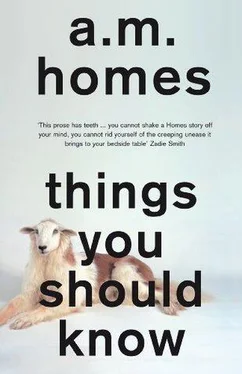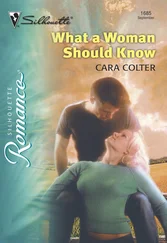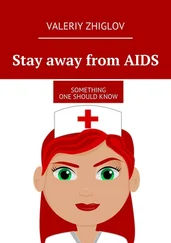“They can’t find my suitcase.”
“Don’t worry, they will,” she said. “They have to. Did your father pick you up?”
“No. Mrs. Henry did it.”
“What the hell’s wrong with him. That’s part of our agreement.”
“I don’t know,” I said.
“Have you spoken to him?”
“I called you first.”
“When you talk to him, tell him to call me right away. That’s all. I’ll deal with him. I don’t want to drag you into this.”
“What if my stuff doesn’t show up?”
“Your father will take care of it,” she said.
According to all reports — except my own — by marrying Dr. Frankle, my mother had done well for herself. On the other hand, my father seemed to have taken a small financial slide. Even though Dr. F. could more than cover the world with money, my father still sent my mother a check every month, supposedly for me.
“Did they leave you lunch?” my mother asked.
“I’ve been invited out.”
“Well, have fun. I’ll talk to you Saturday morning before my hair appointment. If you need anything just call.” I could hear air rushing through the sprockets of the Lifecycle.
My father answered his own phone at the office. “Hi ya, sport. Get in okay?”
“My suitcase is temporarily dislocated.”
“Happens all the time.”
“Mom wants you to call her.”
“Why?”
“I don’t know,” I said, lying.
“Well, I gotta get to work,” he said. “There should be something there for lunch if you’re hungry.”
“I’m invited to the Henrys’.”
“Oh, that’s good. Well, run along. Don’t keep people waiting. And don’t forget, Cindy’s making dinner tonight.”
“Great.”
Every year Cindy made dinner my first night in town. “A real dinner,” she called it: sitting down, plates, glasses, a meatlike item, strange salad — one year with flower petals in it — doctored brown rice, and herbal iced tea. After that, for the rest of the summer, eating was pretty much something I took care of at the Henrys’, where they seemed to have a firmer grasp of what was food and what was indigenous vegetation, animal habitat, something to be seen, perhaps cut and put in a vase, but certainly not eaten. Sometimes, I’d ride to the grocery store with Mrs. and buy real food, making sure to get enough for my father and Cindy, who ultimately ate more crap than anyone.
Cindy was ten years younger than my dad, and all they’d talked about when they bought this place was how great it was for kids. For these five years, I’d felt the burden of making that seem true.
“He shops,” I once overheard Cindy tell someone. “And he’s such a pleasure to have around.”
A pleasure because I was hardly around. Plus, I was household-oriented. I liked things clean and neat. I found comfort in order. I was also used to being around people I didn’t know, living with people I wasn’t related to. I kept my own secrets. I’d taught myself to be a little less than human. I’d taught myself to be a person whom people like to have around, half boy, half butler: half, just half — no one wanted the whole thing, that was one of the tricks, if you wanna call it that.
I pulled the box of chocolate I’d brought for Mrs. H. out of my carry-on. I’d picked liquor-filled, thinking it was safer than milk chocolate in terms of keeping it from Henry and baby June. Liquor-filled tasted so foul that only an adult would eat it. I washed my hands and face and set out for the Henrys’.
Lunch was like something out of a commercial or a dream, although I suppose there was nothing unusual about it. Baloney-and-cheese sandwiches on white bread — mayo on one side, mustard on the other, and pale pink meat and yellow cheese in the middle. Heaven. In Dr. Frankle’s house the only baloney was verbal, and in my father’s the only meat was a soy-based pseudohamburger mix called bean-burger.
“Chips?” Mrs. Henry asked.
“Yes, please.” Real chips, not extra crispy, gourmet deep-bake-fried, slightly, lightly not salted. Normal American chips out of a big old bag-o’-chips. I was glowing. Orange drink. Not orange juice, but drink. It may as well have been a birthday party. Henry didn’t notice, he didn’t care, he didn’t appreciate anything.
Mrs. H. topped off my glass. My tongue would be orange all day; if I sucked on it hard, I’d be able to pull out little flashes of flavor for hours to come.
“I’m so glad to be here,” I said, meaning it completely.
“We’ve missed you,” Mrs. said.
“I haven’t,” Henry said. “I’ve been busy.”
“Oh, Henry, you sit in the house, whining all the time, ‘I’m bored. There’s nothing to do.’”
“TV is your best friend,” I said.
“No, yours,” Henry said.
“No,” I said. “Yours. We don’t have a TV.”
“God, how depressing,” Henry said.
There was a moment of silence while everyone — even Mrs. H. — reflected on the idea of life without television.
“That was great, thank you,” I said to Mrs. when we were finished.
“It was baloney,” Henry said.
I carried the plates to the sink.
“You’re so considerate,” Mrs. said, staring Henry down.
I try, I said to myself. I try so hard.
“Come on,” Henry said. “Hurry up.” He pushed me out the screen door.
From the edge of their backyard, if I listened hard, I could hear the deceiving rush that five years ago I thought was water. From the end of this block that went nowhere — dead-ended three houses away into a thick wood — I’d heard a clean whooshing sound that I thought was a lot of water. A waterfall maybe. A paradise on the other side of something. An escape from the starkness of this street. Before I knew better, I went charging off into fifteen feet of thick woods, the kind of woods bogeymen come from, woods where little kids playing find a human hand poking through the leaves, the nails long from the inattentions of the not-so-recently dead, the kind of place where animals crawl off to die. I punched my way through only to find that what whooshed and roared was an eight-lane highway where a hundred thousand cars sliding by in both directions had the nerve to sound like a waterfall. Hearing it again on this first afternoon depressed me.
“Give me your glasses,” Henry said, kneeling down.
I handed them over, imagining Henry slipping the frames under the ball of his foot, and then leaning full forward, laughing at the snap-crackle-pop sound of two hundred and fifty dollars shattering.
“They’re very expensive,” I said.
“I’m not buying them.”
He used the glasses to catch the sun and burn holes through an old dead leaf.
“Handy,” he said, giving them back to me. “I guess you can keep them.” He stopped for a second, then looked at me. “So, what’s wrong with you, how come you’re not talking? Brain go blind, too?”
“Trip,” I said. “I don’t like to fly.”
“Wouldn’t know,” Henry said. “Pool’s open. We can go tomorrow.”
In Philadelphia there was a community pool, long and wide. All you had to do was show up and sign in. Henry and I ruled it in the summer. We never took showers before entering. We stepped over the vat of milky green below the sign ALL BATHERS MUST IMMERSE FEET BEFORE ENTERING WATER. Whatever disease we might have had, we thought it better than the lack of disease we saw around us, we wanted to infect everyone, anyone, we wanted everything about ourselves to be contagious, we were dying for someone to be just like us. We were the boys who only got out of the water when the guard blew his whistle fifteen minutes before the hour — every hour — and announced, “Adult swim. Eighteen and under out of the pool.” Those words were mystical, almost magical. We’d crawl out and sit by the edge watching, as if adult swim meant that the pool would become pornographic for those fifteen very adult minutes just before the hour. But nothing ever happened. The only pornography were the old women with breasts big enough to feed a nation and old men with personal business hanging so far down that it sometimes fell out the end of their bathing suits.
Читать дальше












